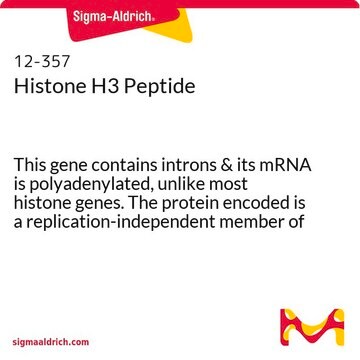P6762
Poly-L-aspartic acid sodium salt
mol wt 15,000-50,000
Sinónimos:
Poly(L-aspartic acid) sodium salt
Iniciar sesiónpara Ver la Fijación de precios por contrato y de la organización
About This Item
Número de CAS:
Número MDL:
Código UNSPSC:
12352200
ID de la sustancia en PubChem:
Productos recomendados
mol peso
15,000-50,000
temp. de almacenamiento
−20°C
cadena SMILES
NC(CC(O)=O)C(=O)O[Na]
¿Está buscando productos similares? Visita Guía de comparación de productos
Nota de análisis
Molecular weight based on viscosity.
Código de clase de almacenamiento
13 - Non Combustible Solids
Clase de riesgo para el agua (WGK)
WGK 3
Punto de inflamabilidad (°F)
Not applicable
Punto de inflamabilidad (°C)
Not applicable
Equipo de protección personal
Eyeshields, Gloves, type N95 (US)
Elija entre una de las versiones más recientes:
¿Ya tiene este producto?
Encuentre la documentación para los productos que ha comprado recientemente en la Biblioteca de documentos.
Anna Kubíčková et al.
Physical review letters, 108(18), 186101-186101 (2012-06-12)
Charge reversal as an extreme case of charge compensation is directly observed by capillary electrophoresis for a negatively charged peptide in aqueous solutions of trivalent cations. Atomistic and coarse-grained simulations provide molecular interpretation of this effect showing that it is
Chao Li et al.
Bioconjugate chemistry, 23(9), 1832-1837 (2012-08-09)
Genome manipulation controlled by small metal complexes has attracted extensive interest because of their potential application in the fields of molecular biotechnology and drug development. However, their medicinal application is still limited due to the distinct toxicity of the free
Nam Muk Oh et al.
Colloids and surfaces. B, Biointerfaces, 101, 298-306 (2012-09-27)
Advanced materials that have controllable pH-responsive properties when submerged in the lysosome have a great potential in intracellular drug delivery. We developed novel poly(L-amino acid) nanogels that were prepared by a facile cross-linking of poly[L-aspartic acid-g-(3-diethylaminopropyl)]-b-poly(ethylene glycol)-maleimide [poly(L-Asp-g-DEAP)-b-PEG-Mal] and poly(L-aspartic
Kyung Hyun Min et al.
Biomaterials, 33(23), 5788-5797 (2012-05-18)
A mineral (calcium phosphate, CaP)-reinforced core-shell-corona micelle was evaluated as a nanocarrier of doxorubicin (DOX) for cancer therapy. The polymer micelles of poly(ethylene glycol)-b-poly(L-aspartic acid)-b-poly(L-phenylalanine) (PEG-PAsp-PPhe) in the aqueous phase provided the three distinct functional domains: the hydrated PEG outer
Tomoya Suma et al.
Biomaterials, 33(9), 2770-2779 (2011-12-28)
The delivery of siRNA therapeutics owes its success to the development of carrier systems with high efficacy and minimum toxicity. Here, cationic polyaspartamide derivatives with a regulated number and spacing of positively charged amino groups in the side chain were
Nuestro equipo de científicos tiene experiencia en todas las áreas de investigación: Ciencias de la vida, Ciencia de los materiales, Síntesis química, Cromatografía, Analítica y muchas otras.
Póngase en contacto con el Servicio técnico








